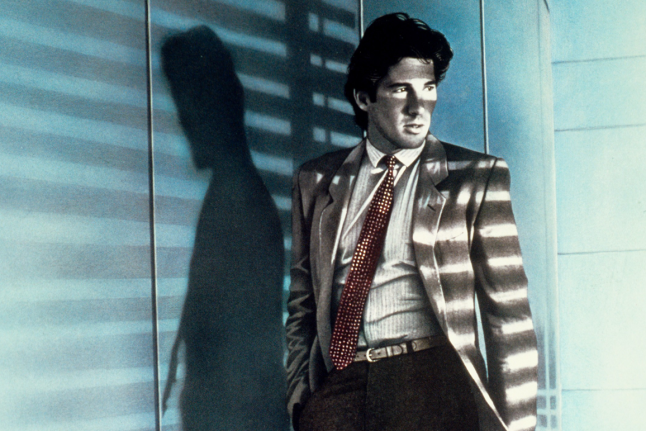Naturally, a movie called American Gigolo would ultimately be billed as a love story in the 80s. For what could be more romantic at that time than the exchange of currency? Julian Kaye (Richard Gere) certainly can’t think of anything better, apart from his ability to pleasure older women for cash, favoring them for his tricks because of his belief that “a high schooler” presents him with no means of showing off his talent, and, in turn having it appreciated. Hence his manifesto, of sorts, that sex with women his own age or younger offers “no challenge. It has no meaning. The other night, that night I met you at the hotel, I was with a woman. Somebody’s mother. Her husband didn’t care about her any more. This woman hadn’t had an orgasm in maybe ten years. It took me three hours to get her off. For a while there, I didn’t think I was gonna be able to do it. When it was over, I felt like I’d done something, something worthwhile. Who else would’ve taken the time or cared enough to do it right?”
No one, apparently. And that’s why Julian is swimming not only in vagina, but also riches. It is his seedier of two “procurers,” Leon (Bill Duke), who warns him that he’s getting too arrogant for his own good, that the older women who love him now will turn on him in an instant. He shrugs off Leon’s ominous warning as he goes to perform a last minute trick for him in Palm Springs. One that turns out to be rougher and weirder than he thought, as the financier, Mr. Rheiman (Tom Stewart), instructs him to handcuff his wife, Judy (Patricia Carr), and “smack that cunt,” among other unexpected demands. The incident leaves an unpleasant feeling within Julian, though he’s soothed and flattered by the pursuit of Michelle Stratton (Lauren Hutton), the bored and neglected wife of a senator rising the ranks. Her fascination with him stems at first from wanting to have the kind of sex that might feel tawdry, but as she tells him, it was even better than that because “it was like really making love.” Surely, Senator Charles (Brian Davies) would never have spent that much time pleasuring her.
As the two become closer–she’s the only “client” he’ll fuck in his own apartment–a change begins to occur within Julian, though he seems scarcely aware of it until he gradually begins to realize he’s being framed for the recent murder of Judy Rheiman. Ignoring all the signs until it gets too out of hand, Julian’s once meticulous appearance (a self-obsession that served as the prototype for most of Bret Easton Ellis’ male characters) grows increasingly disheveled the closer he comes to being pinned down by the police. Even the expensive car he once drove around (to the tune of Blondie’s “Call Me” for heightened allusion to the gayness of being a male escort, thus his need to declare, “No more fag stuff” to Leon) is traded in for a cheap rental after he trashes the former to unearth the planted jewelry he was meant to have stolen from the Rheimans.
That the true culprit behind the frame-up turns out to be Leon for no other reason than, “Because you were frameable, Julie. You stepped on too many toes. Nobody cared about you. I never liked you much myself,” speaks to the way in which it was simply understood in the language of cinematic and literary context that fucked up shit simply happens in life. There’s no “real” or “detailed” explanation for why. It just is. “Julie”–whose name being feminized throughout the film mirrors his overall degradation–accepts that gradually after this confrontation with Leon amid his framed posters of Andy Warhol “Torsos” (the man is, after all, a pimp dealing in rough trade, and so the aesthetic choice is just one of many instances of Paul Schrader’s brilliance, including the constant use of the horizontal striped shadows of blinds as Julian’s imminent imprisonment becomes more likely).
Apart from reasoning that his purpose in life is to make older women feel young and appreciated again, the formation of his career path ultimately took shape because: “It’s all I’m good at.” This he tells Michelle, as though justifying the entire reason for his superficial existence. His focus on clothes, grooming and image is an innate part of assuring “career advancement” in separating himself from all the other “retarded faggots” that his main “procurer,” Anne (Nina van Pallandt), deals with. But even someone as vapid as Julian can’t deny the hollow feeling that has been mounting inside since he began whoring himself out, confessing to Michelle, “All my life I’ve been looking for something. I don’t even know what it is… Maybe you’re what I’m looking for.”
In this way, even a film as nihilistic as American Gigolo would like to posit that love is enough to heal all of one’s emotional wounds. Regardless of our romantic lead hanging out at leather bar The Probe so as to track down his shady pimp, proving that the older you get as a woman, the more prone you are to settling for a man’s faults.




















